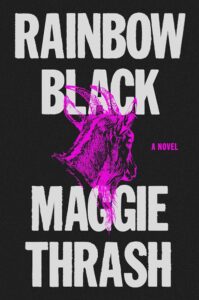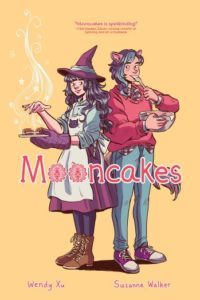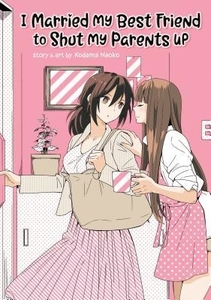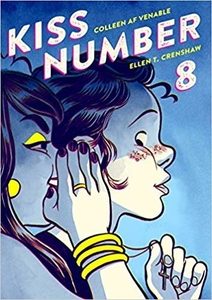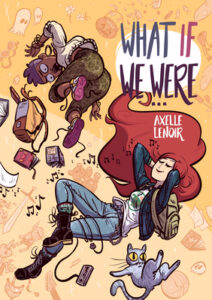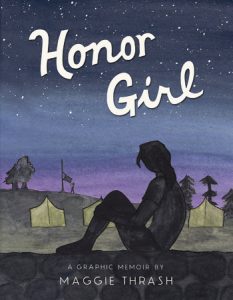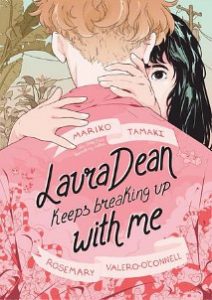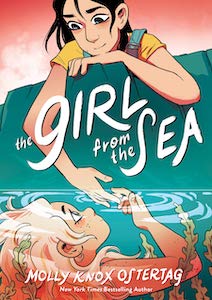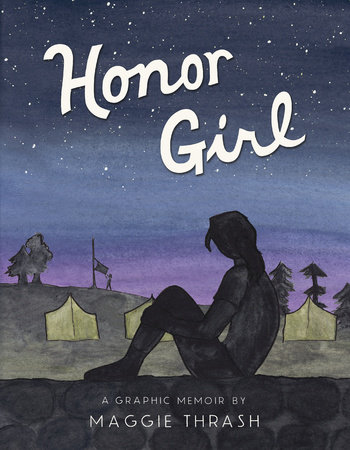In her debut adult novel, Rainbow Black (March 19, 2024), Maggie Thrash (she/her), author of the critically acclaimed young adult graphic memoir Honor Girl, delivers a compelling, witty, and often moving account of Lacey Bond, whose life is forever changed when her parents are arrested and prosecuted for allegedly committing acts of ritualistic child sexual abuse at their rural, in-home daycare during the “Satanic Panic” of the ‘80s and ‘90s.
The story begins in New Hampshire and spans 27 years (from 1983 to 2010). It is told in flashbacks from Lacey’s point of view. In the first few pages of the book, readers find out that adult Lacey and her girlfriend, Gwen, have been implicated in a murder from fourteen years earlier. The story then flashes back to the ‘80s and unfolds over the course of Lacey’s adolescence and early adult life.
Lacey’s parents are arrested when she is 13 and they remain incarcerated pending trial. As a result, Lacey and her 20-year-old sister, Éclair, who is as brash as she is beautiful, are left to navigate their legal defense, as well as the media circus that ensues. As Lacey struggles to come to terms with the reality of what is happening to her family, she is also coming to terms with her sexuality. While she and her family have seemingly always known that she is a lesbian, her exploration of this aspect of her identity is undoubtedly impacted by the crisis in which they find themselves. Although adult Lacey is somewhat insufferable, Thrash endeared me to young Lacey, who is paradoxically both precocious and naïve, and above all else, a survivor.
As a lady loving lawyer, I was drawn to this book because of its queer and legal themes. For the most part, I loved Thrash’s writing style. It is smart, incisive, and wry, and she is a great storyteller. I also particularly appreciated her shoutout to the Pizza Hut BOOK IT! program, which was a highlight of my bookish childhood. I would definitely be interested in reading more of her work. That being said, I could have done without the constant foreshadowing. While I understand that the book was marketed as “part murder mystery, part gay international fugitive love story”, the repeated hinting at what was to come felt like overkill in a novel which was naturally unfolding for me. There was also an instance of authorial intrusion (a literary device in which the author breaks the fourth wall and directly addresses the reader, interrupting the narrative flow of the text) that was somewhat jarring and felt unnecessary as it did not advance the plot or add to the story in any meaningful way. I also thought the 395-page book was a bit long-winded and could have still been just as powerful, if not more so, had it been shortened.
Overall, I really liked Rainbow Black and would recommend it if you’re looking for an interesting story that weaves together queer identity, intrigue, and the law. Special thanks to HarperCollins Publishers and Edelweiss for the advanced copy. Rainbow Black is currently scheduled to be released on March 19, 2024.
Trigger warnings for child sexual abuse, sexual assault, statutory rape, drug abuse, murder, homophobia, transphobia, and racial slurs.
Raquel R. Rivera (she/her/ella) is a Latina lawyer and lady lover from New Jersey. She is in a lifelong love affair with books and earned countless free personal pan pizzas from the Pizza Hut BOOK IT! program as a kid to prove it.

